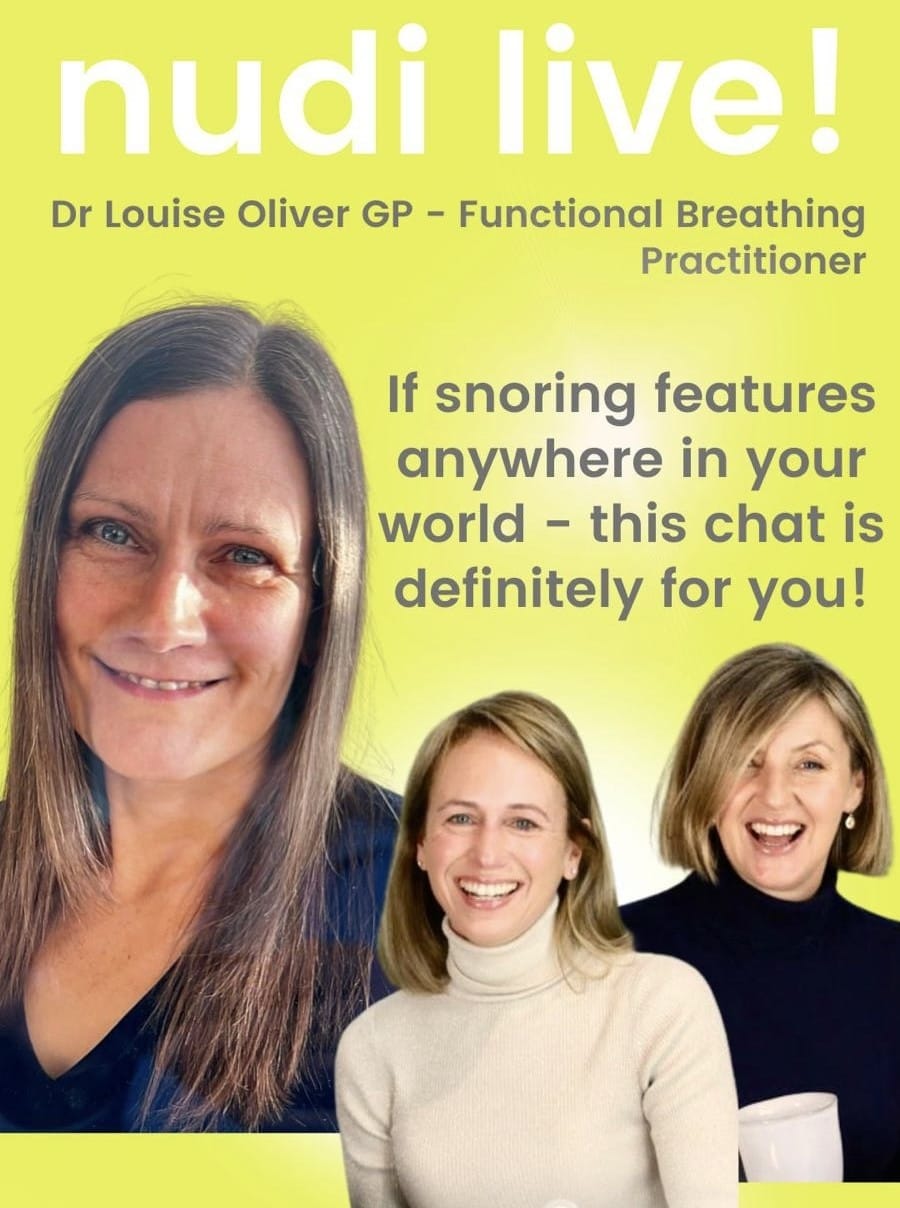
Introduction: The Power of Better Breathing
Dr. Louise Oliver, a seasoned GP with over two decades of experience in women’s health, recently shared her expertise in an Instagram Live session. The discussion revolved around the fascinating relationship between breathing, sleep, and overall health, particularly for women navigating menopause. Dr. Oliver shed light on how hormonal changes during menopause can disrupt sleep and breathing, leading to symptoms like snoring, fatigue, and heightened stress.
This session offered practical advice for women seeking to improve their well-being through better breathing and healthier sleep patterns.
How Menopause Affects Sleep and Breathing
Dr. Oliver began by discussing the link between menopause and sleep-disordered breathing. Conditions like obstructive sleep apnea (OSA) are often thought of as male-dominated, yet studies show they significantly increase in women after menopause.
Hormonal Changes and Their Impact
During menopause, a decline in progesterone—an important hormone for maintaining airway tone— in addition to the menopausal decline in muscle strength which can lead to weaker respiratory muscles and more frequent episodes of snoring or apnea. Weight gain, another common menopausal symptom, often affects the throat and tongue areas, further narrowing the airway and contributing to sleep disturbances.
Sleep Disruption in Menopause
Beyond breathing difficulties, menopause itself disrupts sleep through symptoms like night sweats, hot flushes, and increased anxiety. Dr. Oliver highlighted that poor breathing habits can amplify these challenges, creating a cycle of unrest that leaves many women feeling exhausted and overwhelmed.
Why Mouth Breathing Worsens Sleep Issues
One of the key points Dr. Oliver addressed was the negative impact of mouth breathing, especially at night. While nasal breathing filters air, keeps the airway open, and promotes relaxation, mouth breathing tends to do the opposite.
The Downsides of Mouth Breathing
- Airway Collapse: Mouth breathing encourages the tongue to fall back into the throat, partially blocking the airway and contributing to snoring and sleep apnea.
- Increased Stress Levels: Breathing through the mouth activates the body’s stress response, leading to fragmented sleep and greater fatigue.
- Dryness and Irritation: Continuous mouth breathing dries out the throat and mouth, which can be uncomfortable and may cause infections.
Dr. Oliver emphasized that retraining the body to prioritize nasal breathing can significantly improve sleep quality and overall health.
Breathing Efficiency and Its Role in Well-Being
Breathing is often overlooked as a skill that can be improved. Dr. Oliver explained how inefficient breathing—such as shallow or rapid breaths—can negatively impact various aspects of health, including energy levels, mental clarity, and sleep.
Understanding Carbon Dioxide Tolerance
Dr. Oliver debunked the myth that breathlessness stems from low oxygen. Instead, it often indicates low tolerance to carbon dioxide (CO2). Learning to adapt to carbon dioxide through specific breathing exercises can improve oxygen delivery to tissues, reducing feelings of air hunger and enhancing physical performance.
Simple Techniques to Improve Breathing
Dr. Oliver shared several techniques to help develop better breathing habits:
- Diaphragmatic Breathing: Focus on low belly breaths rather than shallow chest breathing.
- Breath Holds: Maintaining nasal breathing during exercise, briefly holding the breath after the exhale or breathing lightly with a comfortable air hunger can build CO2 tolerance and strengthen respiratory muscles.
- Slow Nasal Breathing: Maintaining a steady, slow rhythm through the nose encourages relaxation and better oxygenation.
Practical Tips to Enhance Sleep and Breathing
Dr. Oliver offered practical solutions that anyone can implement to optimize their breathing and improve sleep quality.
Focus on Nasal Breathing
Nasal breathing plays a vital role in maintaining open airways and reducing the risk of snoring or sleep apnea. Dr. Oliver suggested tools like MyoTape (use discount code LOUISEOLIVER5 at https://oxygenadvantage.com/store/) and nasal strips to help train the body to breathe through the nose during sleep.
Sleep Position Matters
Sleeping on your back can worsen snoring and apnea by allowing the tongue to block the airway. Dr. Oliver recommended side or stomach sleeping as effective alternatives to promote better airflow.
Strengthen the Respiratory Muscles
Engaging in activities like diaphragmatic breathing exercises or even singing can help build stronger respiratory muscles, reducing the risk of airway collapse during sleep.
Manage Anxiety with Breathing
Anxiety, which often spikes during menopause, can further disrupt sleep. Simple breathing techniques, such as slow nasal breathing, can activate the parasympathetic nervous system, helping to calm the body and mind.
Breathing and Menopausal Symptom Relief
Dr. Oliver explained that many menopausal symptoms, including night sweats, hot flushes, and irritability, can be intensified by poor breathing habits. By addressing these inefficiencies, women can alleviate some of their most frustrating symptoms and regain a sense of control over their health.
Real-Life Success Stories
Dr. Oliver shared stories of patients who experienced dramatic improvements in their energy levels, sleep quality, and emotional well-being after incorporating breathing exercises into their routines. These examples underscore the transformative potential of better breathing.
The Growing Concern of Sleep Apnea
Sleep apnea is a serious condition that often goes undiagnosed in postmenopausal women. Dr. Oliver highlighted the importance of recognizing symptoms such as loud snoring, gasping for air during sleep, and chronic daytime fatigue.
Steps to Address Sleep Apnea
- Consult a Specialist: If sleep apnea is suspected, seek a healthcare provider for a proper diagnosis, which may involve a sleep study.
- Treatment Options: While CPAP machines are commonly prescribed, lifestyle changes like weight loss, positional therapy, and breathing exercises can also make a significant difference.
Educating Women About Sleep and Breathing
Dr. Oliver stressed the need for greater awareness about how breathing habits affect health. Many women experience symptoms like frequent waking, morning headaches, or constant fatigue, mood disturbance, nightmares, waking to pass urine during sleep or memory impairment without realizing these could be linked to sleep-disordered breathing.
Resources and Programs
To address this gap, Dr. Oliver offers resources ranging from individual consultations to group workshops and retreats. Her programs provide actionable tools to improve breathing efficiency, enhance sleep, and support overall well-being.
Conclusion: Transform Your Health Through Better Breathing
Dr. Louise Oliver’s Instagram Live session highlighted how small changes in breathing habits can lead to significant health improvements. For women navigating menopause, optimizing breathing can reduce symptoms, improve sleep, and enhance quality of life. Simple practices like nasal breathing, better sleep positioning, and targeted exercises can help women regain control and feel more energized.
Whether you’re dealing with snoring, poor sleep, or anxiety, Dr. Oliver’s evidence-based approach provides practical solutions for better health. Follow her on Instagram at @DrLouiseOliverTLC or visit her website for more information on her programs and workshops.
Our Products

Adhesive Remover Starter Kit
Designed to remove the most stubborn patch or tape glue from all skin types in a neat travel sized pack .
- Nudi Spray™ 50ml
- Easi Pad™
- Nudi™ Patch Bag
£15

Glue Free Forever!
Subscribe & Save
Enjoy our great value subscription direct to your door without giving glue another thought.
- Nudi Spray™ 100ml
- Easi Pad™
- Cancel anytime
£16

Top Up!
Designed to remove the most stubborn patch or tape glue from all skin types in our larger 100ml can.
- Best Seller
- Nudi Spray™ 100ml
- Easi Pad™
